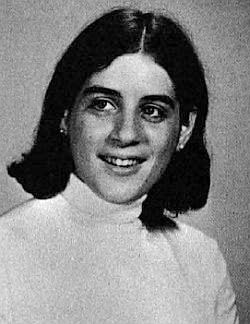Well, at the risk of sounding corny, what I remember most about those years at HCHS--or have the most nostalgia about--is how much NYC felt like a small town. I remember that we dedicated our yearbook to "the City of New York," and though I didn't quite understand that at the time, it felt right. For me, part of that community feeling came from being a member of the huge crowd commuting from Stuyvesant Town and Peter Cooper Village--we would meet randomly on the 23rd St crosstown bus and (what was then called) the IRT--and this was our city! Inevitably, someone had lost their bus or subway pass in the course of the month, and we had learned how to peel the cardboard apart so that two people could share one pass. This made me feel so worldly and sophisticated--even though I think the transit workers who were shown only the front or back surface of the pass were in on the scheme.
Do other people remember—meeting at Mayhews after school? (We had what was virtually a dedicated table in a back corner, and only in retrospect do I realize how unwelcome we probably were by the management. But it was our spot!) Or meeting in the spring of 1967 in Central Park to hear an outdoor concert? I don’t remember who was performing, only that the juniors and seniors found one another by waving our junior and senior hats above the crowd (we had a sombrero, if I remember correctly, and the juniors had some sort of pink cloche). Who needed cell phones? This was our home turf!
During the transit strike of 1966 I walked the several miles to school and back, and one day, as I was waiting for the light to change at 23rd and Lex, a limo pulled up and out stepped Mayor Lindsay, offering a ride to anyone who needed to go downtown. At the time I don’t think I realized what a remarkable coincidence this was—for the mayor of this vast city to stop and offer me a ride. But that’s because it felt like my home village. On the day Kennedy was assassinated I was taking a break from studying for Uniforms (remember those?) and walking around the Village—and suddenly everyone came pouring out of the cafes and shops on to Bleeker Street shouting and crying and looking for some feeling of community comfort. I guess this is how it must have felt on 9/11, but I was living in Massachusetts by then.
I realize all these memories have to do with the city, more than with HCHS. Perhaps this is because I moved away 35 years ago and am appalled at what it has turned into (i.e., the wealth) and how there would be no place anymore for the garment worker’s daughter from Stuyvesant Town (indeed, there is no garment market anymore). Of course, what the city also doesn’t have now is the crime that overshadowed us—or maybe just me, because my parents were particularly fearful. And what I really longed for—though I could not have articulated it at the time—was to be a real part of the Greenwich Village folk scene, not just a confused and naïve high school girl.
So, I guess this is more about my NYC youth than about Hunter, but really, Hunter was at the center of everything. Reading To the Lighthouse in Miss Monkmeyer’s class; having the intuition in Miss Gargiulo’s math-for-dummies class that a certain trig problem could probably be worked out on a graph—the only mathematical insight I have ever had; being advised in private by the 10th grade chemistry teacher (what was his name?) to learn how to answer the sorts of long-form essay problems presented on the Regents exam, because he knew (without making any judgment whatsoever) that I understood very little of the material, but that I could do well on the exam if I learned a few little tricks in advance; Mr Hoopes smiling at me ironically in 9th grade English as I earnestly narrated some little insight or other and saying, “You know, Ella, you are very earthy.” I still don’t know if that was meant to be a compliment.
But of course we are all grown up now (indeed, we are elderly—how did that happen?), and these rosy memories are very selective. So to end on a note of reality: In the early ’80s, right before I moved away from the city, I actually substitute taught at Hunter for one day (in the new building), and Miss Burstein, who was my caretaker for the day, made it clear that, to her, my performance was quite inadequate. It so happened that a few weeks later I found myself on a crosstown bus sitting opposite Mme. Ghnassia, whose French class I had been in for, I think, three years. I said something like: “Mme. Ghnassia, you probably don’t remember me, but I was in your French class at Hunter, and though I didn’t realize this at the time, in retrospect I think you were the best teacher I had there.” She stared at me coldly and replied: “Get away from me.” |
